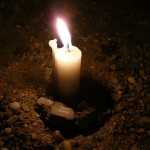Part II: A Society in Upheaval
Part III: Fairy Gold
Part IV: Oppressor and Oppressed
Part V: Speaking in Meeting, Kenyan-Style
Part VI: Paths I Might Have Taken
Peter’s Spiritual Journey Begins…
Folklore has stories about objects that change as you carry them from one place to another, like Fairy gold that turns to clay in your pockets when you return home. Christianity did something like that when I traveled from America to Kenya. Waking up in another world, I took a piece of worthless clay from my pocket and saw it shine like gold.
For one thing, the Quaker missionaries in Kenya have a more complex history than most. The imperialist occupation was British while the missionaries, by in large, were American, and to this day Kenya is one of the places in the world (one of very few, post-Bush) where you get a better reception if you’re a visitor from America than from elsewhere.
The missionaries in Kenya worked to alleviate suffering. When the British instituted a hut tax to be paid in hard currency, this forced large numbers of subsistence farmers off of their own land and onto British plantations where they could work for cash wages. American missionaries responded by helping to develop cottage industries like brick making, so that small rural farms could generate cash income. (Though one can ask why the missionaries never directly protested the taxes…) Among missionaries, the Quakers were unusual in having a strong concern for women’s rights. Many different missionary denominations started boys schools; the Quakers started schools for girls as well. Quaker missionaries were also a driving force in the elimination of female genital mutilation as a common practice, and pushed to eliminate dietary taboos that caused significant malnutrition among pregnant women.
Still, the harm is a fact of history that contemporary missionaries like my friend Eden Grace live with every day. There’s no escaping it—not if you keep your eyes open. And yet, on the ground, there is work to be done…
And on the ground, the landscape of African Christianity looks very different than it does from over here, peering at it through a telescope from the heart of the industrialized west.
In America, when a Christian exhorts you to read the Bible, accept Jesus, and be saved, the inescapable subtext is: Those people are bad. Those people are damned. Come join OUR group, do it OUR way, and become one of the good people. American Christianity exists within a pluralistic society. We have neighbors who are Jews and Muslims, Hindus and Buddhists, Pagans, Wiccans, secular humanists, Native Americans, Mormons, Jehovah’s Witnesses… All of us, if we’re willing to look around, can see people from a variety of religious faiths and spiritual disciplines whose every word and every action is grounded in faithfulness.
And we have all heard Christians decry even the best of them as unbelievers and damn our society for its pluralism. If you read the Bible, if you believe the words of St. Paul, then Mahatma Gandhi has to be burning in Hell. Not for any sin, but for being a saint bearing the wrong brand name. In a pluralistic society, believing in Jesus means believing in Jesus’ exclusive copyright. Nice Christians will talk about the “scandal of particularity.” Less nice Christians will talk about the heathens being cast into the pit. But all of them are aware on some level of the tension between a universal God who loves us all, and a salvation that is exclusive to the members of one particular sect.
When you step off the plane in Kenya and look around, the religious landscape looks completely different. Kenya does have lots of sects, Quaker and otherwise. Kenya also has a lot of intertribal mistrust (largely an aftereffect of the colonial occupation), but Kenyan religion didn’t seem, from what I saw of it, to be sectarian in anything like the way American religion is. It’s like, Americans are always asking for the best and latest diet; Kenyans are just asking for food.
Kenya did not have the misfortune of conquering half the world and then having to assimilate half the world’s cultures and religions. Kenya was conquered. And when Kenyan Christians exhort you to put your faith and trust in God, it’s not about My God can beat up your God; it’s about God can give you strength and hope when you are beaten and oppressed, watching your society torn apart and your family dying.
In Kenya, Christian faith shines like gold.
In Kenya, the task of throwing off colonial rule and building a stable and peaceful democracy has been (and still is) a desperate struggle. They don’t have a comfortable status quo to fall back on. Spiritual su rvival and physical survival are both tenuous, and when Kenyans find a way for Spirit to touch their lives, I think they’re less inclined to question the packaging.
rvival and physical survival are both tenuous, and when Kenyans find a way for Spirit to touch their lives, I think they’re less inclined to question the packaging.
There are certainly American Christians who try to see their religion this way, casting the struggle not as one of Christianity vs. other forms of religious expression, but as Christianity vs. chaos and destruction. Often what they’re talking about is the chaos brought on by gay marriage, universal health care, teaching evolution in the schools, and the worldwide conspiracy of scientists to dupe us into curtailing global warming.
But in Kenya the chaos is real. It’s hunger and malaria, poverty, displacement from the land, and the ghastly spectacle of intertribal genocide in neighboring countries.
A second reason that Kenyan Christianity is so different has to do with history. It is hard for me to turn to historical Christian writers for inspiration or guidance because, before I can open myself to any real message of Spirit they might have for me, I have to ask to what degree they took part in religious wars or the violent suppression of rival sects and how much of their writing is just an apology for the theological views of the winners against those of the slaughtered.
That question just doesn’t come up for Kenyan Christians. The missionaries came, and they offered hope. Kenyan Christianity doesn’t date back any further than 1902, and to my knowledge it hasn’t sponsored a single pogrom in that whole time.















